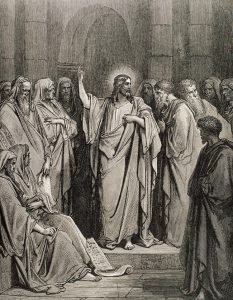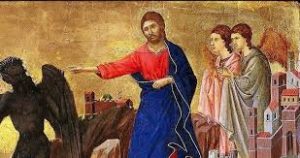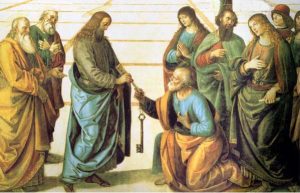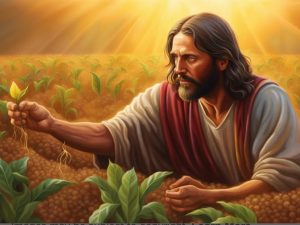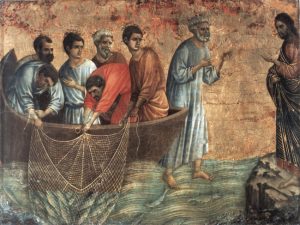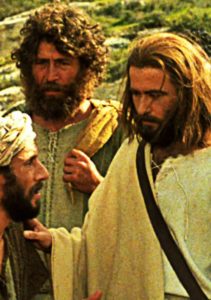Today, we celebrate the 14th Sunday in Ordinary Time, Year B. This is my first time to celebrate mass at this Cathedral of Reno. I have concelebrated with Bishop Calvo and Bishop Mueggenborg for various occasions, but not as the main celebrant. It is my joy to be assigned at this Cathedral, the seat of the Diocese of Reno. I am also familiar with your patron saint, St. Thomas Aquinas, because I studied philosophy and theology at the University of Santo Tomas, the oldest University in the Philippines and in Asia. Thank you for your warm welcome! We will journey in faith together, and please don’t hesitate to approach me.
This Sunday’s readings focus on how we accept Jesus as the Incarnate God, and how the Holy Spirit works in us as we continue to know ourselves better so that we can relate to each other as members of God’s family. Oftentimes, we disregard the Lord speaking to us and are not keen to listen to Him, and we become vulnerable. We rely on our own power.
The 1st reading from the book of Ezekiel tells us about the rebellious attitude of the people of Israel to whom God sent a prophet to inform them about the Lord’s instruction. We remember that all prophets must speak on behalf of the Lord God. For Ezekiel, though difficult, he has to swallow the Word before speaking to his people, meaning to say that a prophet needs to realize that he is a messenger. It is his job to remind the people sternly that the Lord has a message for their salvation for He is their God. A prophet has always been inspired by the Holy Spirit.
In the 2nd reading from the second letter of St. Paul to the Corinthians, Paul claims that the good Lord says to him, “My grace is sufficient for you, for the power is made perfect in weakness.” (v.9) We learn from St. Paul that as we go through our weaknesses, we put constraints on our will which makes us vulnerable; however, the power of the Holy Spirit guards us not to wear us down. With the spiritual power of Christ, it can make us stronger. When persecutions, tribulations and weaknesses come, we can certainly take up our cross, for St. Paul taught us saying, “For when I am weak, then I am strong.” (v.10)
This is a very clear lesson that we need to reflect on as His disciples, that is, Jesus won’t stop us from receiving trials and sufferings in life. However, experiencing weaknesses in life, we put everything into God’s hands. It is a call to humbly submit ourselves, including our weakness; at our lowest point is to experience the absolute power of God.
The gospel taken from St. Mark narrates to us the story of Christ’s rejection in Nazareth. We need to open our hearts and minds to seek consolation from this gospel story.
First, Jesus came to His native place accompanied by His disciples to teach in the synagogue. And “many who heard Him were astonished.” (v.2) They questioned His authority. Obviously Jesus had experienced continuous rejection which led to His crucifixion and death. We have been part of that progressive rejection because God intervenes several times in our lives, yet we are tempted to deny, to reject, and to resist the healing we have received to the point of completely forgetting all spiritual blessings from the Lord.
Second, people asked, “Where did this man get all this?” (v.2) Jesus’ neighbors belittling Him, maybe looking for His credentials or qualifications, and questioning His family and background, being troubled about where He got this wisdom. Jesus, knowing all this, said to them, “A prophet is not without honor except in his native place.” (v.4) Jesus’ townsfolk were not interested in listening to Him and knowing that His power and wisdom come from His divine power as the “Son of God.” Jesus “did not perform mighty deeds there apart from curing sick people.” (v.5) Thus, Jesus leaves His native place, visits other places, and finds people who are much more willing to embrace Him.
Third, Jesus was “amazed at their lack of faith.” (v.6) The reason why Jesus left His native town was not to manifest indifference or apathy against them, but they failed to recognize God’s visitation and failed to give honor to the person sent by the Father. Their unbecoming attitude towards Him, meaning their lack of faith, was the reason to depart from them.
Our attitude is unacceptable to God when we are too self-centered. There is no room to know the right thing because we focus on ourselves. We need to do something positive by changing our own views and behavior towards God and others that would bring us to an intimate encounter with Jesus.
I pray that we, like St. Paul, can learn to accept our human weakness by the power of God. We believe that with Jesus Christ, we are strong! Like the Prophet Ezekiel, we have the Holy Spirit to convert us, being a prophetic person in your life, building up our family and community to take to heart the things we heard as gospel truths.
God bless you.
Fr. Arlon, OSA
——————————-
El dictado del corazón
Decimocuarto Domingo del Tiempo Ordinario, año B (7 de julio)
- Ezequiel 2:2-5
- Salmo 123:1-2, 2, 3-4
- 2 Corintios 12:7-10
- Marcos 6:1-6
Hoy celebramos el Decimocuarto Domingo del Tiempo Ordinario, Año B. Esta es la primera vez que celebro misa en Catedral de Reno. He colaborado en varias ocasiones con Monseñor Calvo y Monseñor Mueggenborg, pero no como celebrante principal. Es un placer para mí el haber sido asignado a esta Catedral, sede de la Diócesis de Reno. También conozco a su santo patrón, Santo Tomás de Aquino, porque estudié filosofía y teología en la Universidad de Santo Tomás, la universidad más antigua de Filipinas y Asia. ¡Gracias por su cálida bienvenida! Veo caras conocidas, pronto nos estaremos conociendo, caminaremos juntos en la fe y no duden en acercarse a mí.
Las lecturas de este domingo se centran en cómo aceptamos a Jesús como el Dios encarnado y cómo el Espíritu Santo obra en nosotros, a medida que continuamos conociéndonos mejor a nosotros mismos, para poder relacionarnos unos con otros como miembros de la familia de Dios. A menudo, ignoramos que el Señor nos habla y no estamos dispuestos a escucharlo, y nos volvemos vulnerables confiando en nuestro poder.
La primera lectura del libro de Ezequiel nos habla de la actitud rebelde del pueblo de Israel, a quien Dios envió un profeta para informarles sobre las instrucción del Señor. Recordamos que todos los profetas deben hablar en nombre del Señor Dios. Para Ezequiel, aunque difícil, tiene que tragarse la Palabra antes de hablar a su pueblo, es decir, que un profeta necesita darse cuenta de que es un mensajero. Su trabajo es recordarle al pueblo con severidad que el Señor tiene un mensaje para su salvación porque Él es su Dios. Un profeta siempre ha sido inspirado por el Espíritu Santo.
En la segunda lectura de la segunda carta de San Pablo a los Corintios, Pablo afirma que el Dios buen dice: “Te basta mi gracia, porque mi poder se perfecciona en la debilidad”. (v.9) Aprendamos de San Pablo que a medida que atravesamos nuestras debilidades, ponemos limitaciones a nuestra voluntad, lo que nos hace vulnerables; sin embargo, el poder del Espíritu Santo nos guarda para no desgastarnos. Con el poder espiritual de Cristo, puede hacernos más fuertes. Cuando vienen persecuciones, tribulaciones y debilidades, ciertamente podemos tomar nuestra cruz, porque San Pablo nos enseñadiciendo: “Porque cuando soy débil, entonces soy fuerte”. (v.10)
Esta es una lección muy clara sobre la que debemos reflexionar como discípulos, es decir, Jesús no nos impedirá recibir pruebas y sufrimientos en la vida. Sin embargo, al experimentar debilidades en la vida, ponemos todo en manos de Dios. Es un llamado a someternos humildemente, incluidas nuestras debilidades; en nuestro punto más bajo es experimentar el poder absoluto de Dios.
El evangelio tomado de San Marcos nos narra la historia del rechazo de Cristo en Nazaret. Necesitamos abrir nuestros corazones y mentes para buscar consuelo en esta historia del evangelio.
Primero, Jesús vino a su lugar natal acompañado de sus discípulos para enseñar en la sinagoga. Y “muchos de los que le oyeron quedaron asombrados”. (v.2) Cuestionaron Su autoridad. Jesús había experimentado un rechazo continuo que lo llevó a su crucifixión y muerte. Hemos sido parte de ese rechazo progresivo porque Dios interviene varias veces en nuestras vidas, sin embargo, somos tentados a negar, rechazar y resistir la sanación que hemos recibido hasta el punto de olvidar por completo todas las bendiciones espirituales del Señor.
En segundo lugar, la gente preguntaba: “¿De dónde sacó este hombre todo esto?” (v.2) Los vecinos de Jesús lo menospreciaron, tal vez buscando sus credenciales o calificaciones, y cuestionando a su familia y sus antecedentes, preocupados por saber de dónde sacó esta sabiduría. Jesús, sabiendo todo esto, les dijo: “Un profeta no carece de honor excepto en su lugar de nacimiento”. (v.4) La gente del pueblo de Jesús no estaba interesada en escucharlo y saber que Su poder y sabiduría provienen de Su poder divino como el “Hijo de Dios”. Jesús “no realizó allí milagros aparte de curar a los enfermos”. (v.5) Así, Jesús sale de su lugar natal, visita otros lugares y encuentra personas mucho más dispuestas a abrazarlo.
En tercer lugar, Jesús estaba “asombrado de su falta de fe”. (v.6) La razón por la que Jesús abandonó su pueblo natal no fue para manifestar indiferencia o apatía hacia ellos, sino porque no reconocieron la visita de Dios y no dieron honor a la persona enviada por el Padre. Su actitud impropia hacia Él, es decir, su falta de fe, fue la razón para apartarse de ellos.
Nuestra actitud es inaceptable para Dios cuando somos demasiado egocéntricos. No hay lugar para saber lo correcto porque nos centramos en nosotros mismos. Necesitamos hacer algo positivo cambiando nuestros puntos de vista y comportamiento hacia Dios y los demás que nos lleven a un encuentro íntimo con Jesús.
Ruego para que nosotros, como San Pablo, podamos aprender a aceptar nuestra debilidad humana por el poder de Dios. ¡Creemos que con Jesucristo somos fuertes! Al igual que el profeta Ezequiel, tenemos el Espíritu Santo para convertirnos, ser personas proféticas en nuestras vidas, edificar a nuestrasfamilias y comunidad para tomar en serio las cosas que escuchamos como verdades del evangelio.
Dios los bendiga.
P. Arlón, osa
